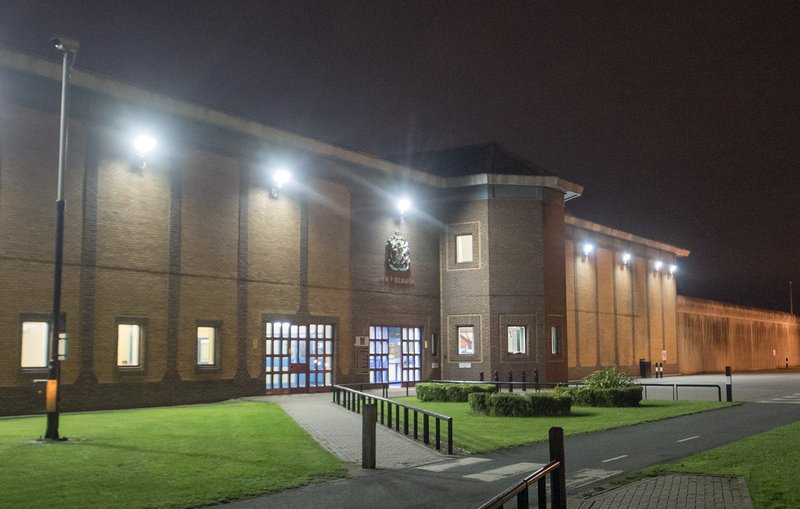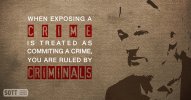angelburst29
The Living Force
Assange was taken to Belmarsh straight after the Westminster Magistrates' Court ruled to keep him in custody.
WikiLeaks founder Assange put into ‘Britain’s Guantanamo’ — agency April 13, 2019
The founder of WikiLeaks, Julian Assange, has been put into the Belmarsh high-security prison in southeastern London, known informally as "Britain’s Guantanamo," Bloomberg reported on Friday citing Assange’s friend Vaughan Smith.
Smith was the last person who visited Assange in the Embassy of Ecuador prior to his arrest this Thursday. He says that Assange was taken to Belmarsh straight after the Westminster Magistrates' Court ruled to keep him in custody.
The Belmarsh prison is known for its harsh security measures. In the past, the facility has held high-profile inmates, such as radical Islamic preacher Abu Qatada, once referred to as "Osama Bin Laden’s right-hand man in Europe."
Assange was arrested by the United Kingdom’s Metropolitan Police Service at the Ecuadorian embassy in London on Thursday, after Ecuador’s President Lenin Moreno had announced the withdrawal of his asylum.
Assange’s associate, detained in Ecuador, released after questioning — TV April 13, 2019
A man with reported ties to WikiLeaks founder Julian Assange, who was earlier detained in Ecuador, was released after questioning, the SVT TV channel reported on Friday citing Ecuador’s embassy in Sweden.
The diplomatic mission announced, citing information obtained from the country’s officials, that "the man was questioned about WikiLeaks, but is free at present."
The Swedish Foreign Ministry has not yet confirmed the detention of its citizens in Ecuador in the past 24 hours.
The UK-based Daily Express reported earlier on Friday that the man worked for Assange as a software developer for his WikiLeaks project. The paper identified him as Swedish national Ola Bini.
Ecuadorian Interior Minister Maria Paula Romo earlier said that a man, who was trying to board a plane to Japan, was detained in one of the country’s airports. She did not reveal his identity, but said the detainee, who has close ties to Assange, was apprehended on suspicion of "assisting attempts to destabilize situation in the country with the aim to harm the government."
WikiLeaks founder Assange put into ‘Britain’s Guantanamo’ — agency April 13, 2019
The founder of WikiLeaks, Julian Assange, has been put into the Belmarsh high-security prison in southeastern London, known informally as "Britain’s Guantanamo," Bloomberg reported on Friday citing Assange’s friend Vaughan Smith.
Smith was the last person who visited Assange in the Embassy of Ecuador prior to his arrest this Thursday. He says that Assange was taken to Belmarsh straight after the Westminster Magistrates' Court ruled to keep him in custody.
The Belmarsh prison is known for its harsh security measures. In the past, the facility has held high-profile inmates, such as radical Islamic preacher Abu Qatada, once referred to as "Osama Bin Laden’s right-hand man in Europe."
Assange was arrested by the United Kingdom’s Metropolitan Police Service at the Ecuadorian embassy in London on Thursday, after Ecuador’s President Lenin Moreno had announced the withdrawal of his asylum.
Assange’s associate, detained in Ecuador, released after questioning — TV April 13, 2019
A man with reported ties to WikiLeaks founder Julian Assange, who was earlier detained in Ecuador, was released after questioning, the SVT TV channel reported on Friday citing Ecuador’s embassy in Sweden.
The diplomatic mission announced, citing information obtained from the country’s officials, that "the man was questioned about WikiLeaks, but is free at present."
The Swedish Foreign Ministry has not yet confirmed the detention of its citizens in Ecuador in the past 24 hours.
The UK-based Daily Express reported earlier on Friday that the man worked for Assange as a software developer for his WikiLeaks project. The paper identified him as Swedish national Ola Bini.
Ecuadorian Interior Minister Maria Paula Romo earlier said that a man, who was trying to board a plane to Japan, was detained in one of the country’s airports. She did not reveal his identity, but said the detainee, who has close ties to Assange, was apprehended on suspicion of "assisting attempts to destabilize situation in the country with the aim to harm the government."




